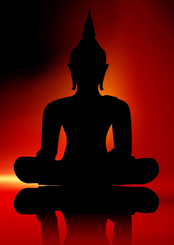By Kobai Scott Whitney –
Whenever the Buddha is asked how to practice mindfulness and concentration there is almost always a standard formula that precedes his instructions. In the Mahāsatipatthāna Sutta it goes like this: “Here a monk, having gone into the forest, or to the root of a tree, or to an empty place, sits down cross-legged, holding his body erect, having established mindfulness before him.”
Even in a time when people were not preoccupied by their cell phones and their computer screens and the torrent of email messages and electronic images flickering on the cable screen, even then, the Buddha had to tell his monks, nuns and householders to seek out a quiet place to do their formal practice.
 I’ve recently been listening to a “Books on Tape” version of Virginia Woolf’s classic primer for women writers called “A Room of One’s Own”. Just as the title suggests, she explains that the reason there were not more women writers is the simple fact that very few women had a room of their own. Remember, she is writing in 1928 and her original audience was a group students at the women’s college attached to Oxford and Cambridge. People who write need “a clean, well-lighted place” to do their work. People who write need to look out the window for tens of minutes at a time before they return to their notebooks or their keyboards. They need, as the Buddha called it, “seclusion.”
I’ve recently been listening to a “Books on Tape” version of Virginia Woolf’s classic primer for women writers called “A Room of One’s Own”. Just as the title suggests, she explains that the reason there were not more women writers is the simple fact that very few women had a room of their own. Remember, she is writing in 1928 and her original audience was a group students at the women’s college attached to Oxford and Cambridge. People who write need “a clean, well-lighted place” to do their work. People who write need to look out the window for tens of minutes at a time before they return to their notebooks or their keyboards. They need, as the Buddha called it, “seclusion.”
Woolf adds one more simple truth: “A woman must have money and a room of her own to write fiction.” And this is the dilemma of all of us who need secluded time: We need the money to pay for the room where we write or meditate or quilt. Virginia Woolf had a lifetime bequest of £500 a year. She talks about it quite frankly. But those of us who don’t have a rich, dead aunt—as she did—must figure out how to make the money that pays for the room. Euro-American culture has resisted the time-perfected arrangement of Asian Buddhists who see the importance of generosity toward the Sangha as paramount. It is this generosity that pays for secluded places and that provides nourishment and shelter to nuns, monks and householders who need seclusion for their practice.
People who meditate need the same simple things and we have to take responsibility for creating the conditions we need to practice. In a new book called “Focused and Fearless”, Shaila Catherine deepens the idea of seclusion by using the word solitude: “We may search for a quiet place to meditate, but true external solitude is not necessary, and may not even exist. I have come to understand solitude as an experience of relationship, specifically our relationship to reality. Lovers of solitude value this relationship and give it attention.
We devote time for meditation, time to listen to silence, time to breathe in the vastness of space that surrounds us, time to make friends with ourselves. People who meditate need the same simple things and we have to take responsibility for creating the conditions we need to practice.
For Americans, especially, the compulsion to work—and to work many hours for corporations that could care less about their employees—this need to work for money is the justification for not practicing. How many times have people told me they have a mortgage, as if that were an excuse to lose their sanity, their health and their ties to family and friends? Our work sometimes gives us the delusion of importance. But it’s still a delusion.
friends? Our work sometimes gives us the delusion of importance. But it’s still a delusion.
Notebooks and wireless connections have made it possible for us work any time, anywhere. How convenient for our employers. We are, in fact, hypnotized by the electronic screens that call to us constantly. Sometimes, when I’m on retreat, my mind drifts with dread to the idea of my email in-box filling up inexorably, unattended by my self-important fingertips clicking away at the keyboard, efficiently guided by my supremely competent consciousness.
Retreats are how we try to get this little taste of seclusion. But the vacation time our employers give us is limited. We need to spend time without family (just as every disgraced politician must do). So a “Day of Mindfulness” on a Saturday or Sunday will have to do. Yet those who have done five-, seven- or ten-day retreats know that it usually takes three days just to settle, to shake off the stress and hypnotic preoccupations of our daily routine. I’ve seen people sneaking out to the parking lot at retreat centers clasping their cell phones, trying to keep engaged with their busy-ness.
So, retreats are one method to get the seclusion and simplicity we need for practice. Another thing that I’ve been experimenting with is to take one day each week and have a real vacation from all electronic communication—no cell phone, no TV, no Internet. I’m often astonished at how often people react with astonishment to this. Some of us just can’t turn off the cell phone for 24 hours. There’s always an excuse for not turning it off, usually some self-imposed obligation to be “reachable.”
Elsewhere, I have talked about how A
merican Buddhists are trying to adjust Buddhism to fit their lifestyles and their schedules, and it’s my contention that we’ve got it all wrong. “The Awakened One” was telling us that we have to adjust our lifestyles to practice the Way. We must remove ourselves from what the sutta translators have glossed as “worry and flurry” (uddhacca-kukkucca). I like the term. It’s one of those phrases that sounds like what it is. “Worry and flurry,” like the Rabbit in Alice in Wonderland, “I’m late, I’m late, for a very important date,” and so forth. We act as if everything on our to-do list is very, very important.
“The Awakened One” was telling us that we have to adjust our lifestyles to practice The Way. We must remove ourselves from what the sutta translators have glossed as ‘worry and flurry’ (uddhacca-kukkucca). At times in my life I have had the experience of waking up, bolt upright in the early morning, with the dreaded feeling of “being behind.” I’m late, I’m behind in my correspondence, I’m behind with my email. And, along with the dread, I must admit there is a certain “enchantment” with my own delusions of self-importance.
As good, corporate culture-infused Americans, we often revert to what I call the MBA strategy for solving problems. We firmly believe that there is no challenge too great that we cannot manage our way out of it. Thus we have “time management,” and “stress management,” “anger management” and—for us poor Boomers—“wealth management.” Is your life or your family or your company having reputation problems? Try “impression management.” We want to have our lifestyle, our delusive self-importance, and our enlightenment experience too.
I’ve mentioned the concept of renunciation (nekkhama) in other talks and writings. But in a conversation with Santikaro not long ago, he suggests that the term nekkhama could just as well be tra

nslated as “simplicity.” So if renunciation is too strong a word, think of applying the principles of simplicity to our daily routine—and to our possessions. Do you have things in storage? Get rid of them. Do you have an investment property? Sell it. Thich Nhat Hanh says somewhere that everything we own demands a certain amount of our attention, so the more things we own, the more our consciousness is worn down by our need to care for or protect these objects.
There are a couple of contemplations I put myself through that seem to help in this simplification process. For instance: One year from now, which of the things I’m doing today will still be important? Or, for instance, How long has it been since I’ve used, or even looked at, the objects I have in storage? Taking such thoughts to their logical conclusion will spawn other elements of re-engineering our lives, like Do I really need that time-share on Maui?
Discussing the “Foundations of Mindfulness,” Bhikku Bodhi explains what’s to happen once we have our simplicity and our solitude. According to the standard formula that accompanies each exercise, a stipatthāna is a mode of dwelling (viharati). This mode of dwelling involves observation of objects in the proper frame of mind. The frame of mind consists of three positive qualities: energy (ātāpa, ardor), mindfulness (sati), and clear comprehension (sampajana). The word sati originally meant memory, but in the present context it signifies recollection of the present, a sustained awareness of what is happening to us and within us on each occasion of experience.
And that’s it. That’s what we’re doing all this for: To have a dwelling place where we can find the energy and the wisdom to see clearly. That’s where the imperative to re-engineer our daily lives comes from—so we no longer spend our every waking moment in fear or delusion or frustrated craving.
Energy. mindfulness, and clear comprehension – these are the fruits of solitude.


